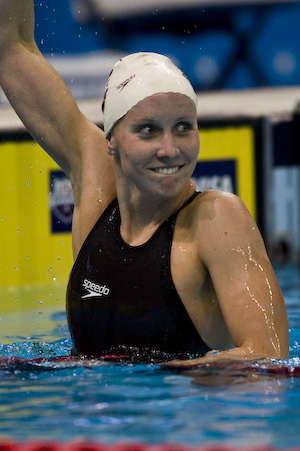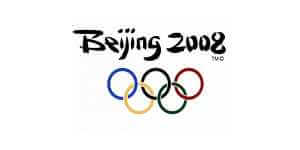Flash Olympian Jessica Hardy’s Tests Positive for Drugs; Hardy Denies Cheating Through Agent; USA Swimming Releases Response; Salo Responds As Well

Story first reported afternoon of July 23. Latest update early July 25. Hit refresh for the latest information.
PHOENIX, Arizona, July 23. A coach with knowledge of the situation, but not on the Olympic staff, has confirmed to Swimming World that Jessica Hardy has tested positive for a banned substance. In addition, Swimming World has spoken with athletes on the Olympic team at the training camp who told us that Hardy is no longer at the camp.
In a later update, the Associated Press reported that "Hardy's attorney, Howard Jacobs, confirmed to NBC News that the former Cal star tested positive for the banned stimulant clenbuterol."
The AP also reported in a later update:
"Jessica denies that she has taken any prohibited substances," Jacobs said. "We're looking into explanations for the positive ."
Jacobs told Abrahamson that the first test administered July 1 after the 100 breaststroke came back negative, as did the final one July 6 following Hardy's 50 free race.
The second test, following the 100 free July 4, resulted in the positive test — the A and B samples — for clenbuterol. The results of the B sample from July 4 were made available Tuesday night.
"That is a very peculiar pattern," Jacobs told Abrahamson. "It does not make sense."
Hardy first burst onto the international scene at the 2005 World Championships in Montreal, where she broke the world record in the 100 breast with a time of 1:06.20. The time still stands as the American record.
Hardy swam for California for two seasons, winning the 100 breast at the 2006 and 2007 NCAA Championships, before turning professional and moving back to California to train with former club coach Dave Salo at the University of Southern California.
If Hardy is indeed outlawed from competing in Beijing due to a positive test, her absence will deal a major blow to the United States contingent in China. Not only is Hardy a medal threat in her premier event, the 100 breaststroke, she's entered in the 50 freestyle. More damaging, however, would be her lack of contributions in relay duty.
While the Australians are favored to win the gold medal in the 400 medley relay, Hardy's breaststroke leg figured to play a major role in the Americans' quest for an upset. With Leisel Jones well in front of the rest of the globe, the United States needed a big effort from Hardy (sub-1:06-range) to stay within striking distance. As for the 400 free relay, Hardy has become a top sprint-freestyler and was likely going to handle a leg in Beijing. Her efforts were expected to go a long way in determing the gold, which will be a fight between the U.S., Australia and the world-record holding Netherlands.
The deadline to add new swimmers to the U.S. Olympic roster has come and gone. USA Swimming can only add swimmers to the events vacated by Hardy from the available pool of talent already on the squad.
Kara Lynn Joyce is the next fastest available swimmer on the roster in the women's 50 free, while Rebecca Soni is the next fastest American on the team in the women's 100 breast.
The news comes just a bit too late to be helpful for Lara Jackson, the third-place finisher at Trials in the 50 free, and Tara Kirk, the third-place finisher in the 100 breast. After not making the team originally, the pair would be bypassed for Joyce and Soni.
The Associated Press reported the following response from Hardy's agent Evan Morgenstein:
Agent Evan Morgenstein told the AP that during a brief phone conversation with Hardy, she told him, "I never did anything wrong. I never cheated."
Morgenstein said he's heard there were conflicting results from Hardy's tests, though he didn't have any details.
"I'm very, very concerned about the confusion of her test coming up positive-negative-positive," Morgenstein said. "She's the one person I would never believe would do anything—anything—to cheat. Ever."
According to a report at NBCOlympics.com, "both her A and B samples have come back positive." NBCOlympics.com also reports that the tests came from Trials.
USA Swimming released the following statement from Executive Director Chuck Wielgus:
"USA Swimming has been notified of the anti-doping proceeding involving a U.S. athlete. The matter is being handled by USADA and we are hopeful that the matter will be resolved expeditiously. Out of respect for the hearing process, USA Swimming will have no further comment at this time."
Salo released the following statement to the press:
At this point, there is not a lot to say other than we are very disappointed with the testing results which is an obvious emotion.
I do not have all the details of the results, so it is difficult for me to make a comment. I have been told that Jessica tested negative on July 1, tested positive on July 4 and tested negative again on July 6. In addition, as often as she has been randomly tested over the past two years in competition and out of competition, there has never been any testing result that has come back in question.
I believe this was an inadvertent consumption of a banned substance and I have urged Jessica to have any supplement, vitamin, etc. that she has consumed to be tested for purity.
Having said that, in 30 years of coaching I have never encouraged and have generally discouraged my athletes of taking supplements of any kind.
The community of athletes — elite and otherwise — do believe in the benefit of supplements and in fact many coaches often prescribe such supplements with the expectations of better training recovery, etc. The worst fears may be realized in this circumstance as it pertains to Jessica – i.e. the supplement industry runs unabated without any controls.
Jessica has come by her results with honest committed hard work.
Hardy is not the first American to be removed from the Olympic swim team before the start of the Games due to a positive drug test. In 1988, Angel Myers won three events at the U.S. Olympic Trials, then was given a two-year suspension when urine tests found Nandrolone, a banned substance that is known to increase muscle growth and red-blood cell count.
According to an article in the October 1988 issue of Swimming World Magazine, Myers appealed to the American Arbitration Association on Sept. 1, the day before the final Olympic roster had to be submitted to the International Olympic Committee. She claimed the birth control pills she was taking had "the same metabolites within the body as does Nandrolone."
Myers' appeal was denied. The American records she set in the 100 free (54.95) and 50 free (25.40) were removed from the record books.
Because the results of the drug test were made public before the roster submission deadline, the third-place swimmers in each of Myers' events were able to be placed on the team. Dara Torres, who placed third in the 100 free and was already a part of the 400 free relay, was entered in the individual 100 free. Janel Jorgensen was now the second-fastest swimmer behind Mary T. Meagher in the 100 fly, and Jill Sterkel became the first American swimmer to make four Olympic teams by her entry into the 50 free.
Torres finished seventh in the 100 free at the Olympics, Jorgensen was fifth in the 100 fly and Sterkel tied for the bronze medal in the 50 free.
After Myers completed her two-year suspension from the sport, she returned in 1991 with the married name of Martino and won gold in the 100 free at the Pan-Pacific Championships. She would make the Olympic team in 1992 without incident, winning gold on the 400 free relay and bronze in the 50 free.
Martino made another trip to the Olympics in 1996, where she won four medals: bronze in the 100 free and 100 fly, and gold in the 400 free and 400 medley relays.
More information will come on this developing story. Make sure to hit refresh for the latest information.




